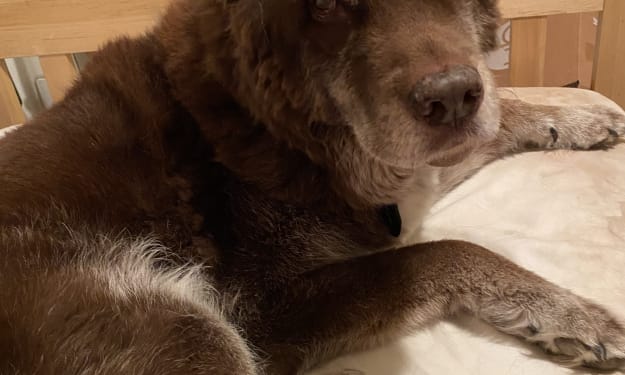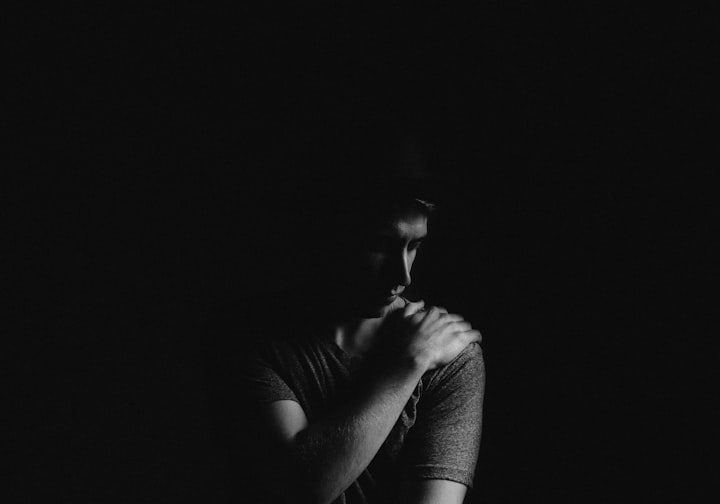Clearing Through Mold
(I wrote this story for an assignment in college.)

He woke up to an overcast sky, and he liked it that way. This weather would ruin the morning of most, but he felt something on the verge of excitement. He found it comforting. He felt grounded, less pressure, less stress when the sun was sealed off by clouds. It was a thick blanket of grey that hid the world, the one he couldn't hide from. The grey seemed to slow things down. Everything, everyone. Suspend time and action, if only a little, and that made it a bit easier.
There was a chance it would rain. Even better.
It took a while for him to drag himself out of bed. Smoked a cigarette, took a shit, simultaneously. Spent too long in the shower, smoked another cigarette before begrudgingly brushing his teeth. He tried to wait until the coffee was brewed to smoke another, but he didn't have much impulse control anymore. He used to swear he would never smoke in his home because of the lingering smell it imprints, but he didn't care at this point. He hadn't for a while. He didn't even notice the smell now.
He wasn’t depressed per say, although it would appear to be so. He was defeated. He was indifferent. He wasn’t that old, but he felt that old. He was tired. He had been through a lot, or so he thought. He didn’t like to think about that stuff anymore. Maybe that was the problem.
He got dressed, went down the three flights of stairs, entered the street, wrestled off the lock and feebly mounted his bike. His destination: work. His line of business: groceries. He hated this job, but he couldn't handle much of anything else. It certainly wasn't relaxed, but it wasn't as overwhelming as what's considered to be a real job.
As he snaked through the streets he thought about his disdain for the grocery store, and work in general. How it was eating away at whatever inspiration or motivation he had left to cling to.
He had come to the city to be a musician. He gave up on college for that. And now he was stocking shelves at a grocery store.
His day at work was typical. Dealing with customers who nagged, complained, asked where things were that they could've easily found themselves. That's what the signs were for. One lady practically made him shop for her. They kept him longer, a lot longer, than he was scheduled, but he didn't possess the brazenness to say no.
After about eleven hours, he started the bike ride home. He buzzed past those carrying on in the streets, moving nowhere fast, talking about nothing. He came off the curb, and he did a poor job of it. Fell with a crash, rolling into the road, earning more scrapes and bruises than he was worthy of. But he felt no embarrassment. He didn't care about what people thought.
He climbed up to his apartment, thinking about how routine his routine was. He put some water on the stove, flopped on to the couch, turned on the news, smoked a cigarette. He tuned in and out of the day's commentary. Weather, famine, a dog riding on a horse, wildfires, mindless politicking. Solemnity, laughter, repeat. And then, commercial.
The water was boiling over. He got up a lot slower than most people would have, did not run but walked to the stove. Adjusted the temperature, dropped in a block of ramen noodles. Pulled out a bowl, cracked an egg, scrambled it, threw in some cilantro. He did like to eat, even if he couldn't afford to eat well. Poured the ramen into a bowl, splashed in some hot sauce. Back to the news.
He was more attentive now because of the warmth rushing through him. Yet, no matter what was happening, it wouldn't really affect him, as it wouldn’t really affect most people. Everyone thinks that the world revolves around them. That was a common phrase. He didn’t want to be common. Though, he didn’t like to be much of anything anymore.
His ramen disappeared, slowly but steadily. Time for sleep. He took to his room, flicked the switch. The light flickered on. That bulb needed replacing. He’d change it some other time.
He crossed towards his bathroom. Double take. The patch of mold on his wall had grown, a lot. It had started out as a few spots that had begun to play a spidery game of connect-the-dots with themselves. But now they had united into a single form, spreading into a massive, dingy blob that stood out against the wall, as discolored as it was. It looked like it had a life of its own, and of course it did, at the microscopic level. The sentient stain looked as if it was lingering, waiting as a predator awaits its designated prey to make the first move.
He realized how stupid this was, for him to be waiting for a gob of mold on his wall to move. So he mustered up the courage he peculiarly needed to move closer, to really give it a good look. It gleamed before him, a harrowing matrix of fungus in the middle of his place of rest. He didn’t know what drove him to do it, but he reached out and touched it. Part of him expected his hand to fall straight through the wall into some sort of chasm. His hand sank into the muck, immersing his fingers and his palm into the ooze, embracing it. It wrapped around his hand; it was moving, churning. It was crawling and swarming before him, and then it swallowed him, and everything went black.
He was in the parlor room of his old house, the one he had grown up in. He was sitting in a chair, his chair, a squashy armchair that had molded around his frame. He had a book in his hand. Brave New World. Aldous Huxley. His younger sister was on the ground a few feet away, playing with her doll. Raggedy Ann. It certainly was raggedy; it had belonged to their mom when she was a girl. She was humming “Row, Row, Row Your Boat.”
He watched her intently. She was so innocent, angelic even, sitting there, perfectly blissful with her doll and her tune. So simple, untroubled. She began stroking her blonde hair, fair and delicate. She looked up at him and smiled, and he smiled back.
Then she started tugging at it, working up a heavy breath, screaming, ripping the locks from her head, throwing them violently into the air. She stopped and looked back at him, tears in her eyes. She was bald. “Why?” she whimpered, ever so softly. He couldn’t respond.
He was making his way up the staircase. He called her name repeatedly. No response. Their father was waiting in the car; he didn’t like to be kept waiting. He approached her door and knocked, entered.
The morning sun was beaming through her curtains, a radiant red consuming the room. She lied there in her bed, covers drawn up to her chest. Her eyes were halfway open. He approached her. Her face was white, chalk white. He reached for her hand, slowly, trembling, but before he could reach it she had sprung hers, gripping his wrist, clutching it fiercely, digging in with her nails. He tried to pull away; she wouldn’t let go. The red grew brighter, sweeping around him, burning through the room, enveloping them both.
He opened his eyes to the ceiling, the ceiling of his room, drenched in sweat, gasping for his heart to slow. It had been so real. He hadn’t dreamed of his sister for a long time; he had hoped the dreams would stop altogether. And this one had been more vivid than any before, more disturbing.
There was mold above him. It had crawled up from the wall and spun a web across the ceiling. He traced it downwards. He was a couple of feet from the big mold patch, which seemed to have grown even more sizable overnight. He rolled over in the opposite direction and pulled himself up. He looked back at it, imposing, towering over him. He thought of how supposedly dangerous it was to be exposed to mold, and this was a substantial amount of mold.
He had to be rid of it. But he couldn’t help admitting that he sort of liked it, the way it surrounded him, seeping. It brought him a strange sort of comfort; it was encompassing, something organic, a life form, a force that was getting more life from his apartment than he was.
He reached for a cigarette, lighter, lit for the usual complacency. But it didn’t taste right. He scuttled to the toilet and threw it in. He vomited. That made him feel better.
He wasn’t going to go to work that day. He didn’t bother to call the store. He flopped on the couch, his go-to place for refuge, flicked on the news. But he didn’t want to lie there; he wanted to do something. He wasn’t quite sure where this was coming from, but he acted on it, just to see where it would lead, how long it would last.
He went to his room and sat at his desk, the surface of which hadn’t shifted in a long while. He pulled out his notebook. He had gone through so many of these over the years, yet this one had a lot of space left in it. He hadn’t written in, he didn’t know how long. He used to do this every day. It read, “I didn’t think dying would be so hard. I didn’t think living would be so hard. Waking up in the turning tide was easier than living through your eyes. I’m sorry I didn’t say goodbye.”
He closed the book. He looked up, closed his eyes, spun around in his chair. He opened to see that mold glaring at him, gloating, grinning. Those lines weren’t his, they were from some movie he had watched. He knew this because underneath them it said, “from random movie”.
He spotted his guitar leaning into the corner, covered by some laundry. He unearthed it, tuned it. He knew the pitches in his head, which was good because he couldn’t use his piano. That was out of tune as well. He played an F chord, then a Bb7, Bdim, another F, D7, Gm7, C7, and a couple more Fs. Standard blues progression. He started it again, this time humming abstractly. He got the notebook and started to write.
He spent hours playing and writing. Every now and then he’d look up at the mold and smirk at it, like he was showing it up or something, performing for it. The more he went the more confident he became, the easier his fingers crossed over and slid up and down the fretboard, the better he controlled the tone, improvising and humming as he went along. He did this for hours, but he wasn’t counting.
After that he mustered up the vigor to tune the piano, which was not an easy feat. But he didn’t have to force himself to do this; it just appeared, the energy, the ability to do so that is, which was weird. Somehow the pitches were perfect in his head for reference, and the tuning was done with impossible efficiency. Then he sat down at the piano to play. Concerto No. 1, Tchaikovsky. Standard, although he hadn’t played it in years. But it happened, intensity pulsing through him, losing himself.
He spent the day being productive. He rummaged through the heaps of stuff situated haphazardly around the place, sorting through, giving things some strategic placement. He vacuumed, dusted, mopped. He cleaned the bathroom, tidied up his room, keeping a safe distance from the mold, as to not disturb it. He shaved clean for the first time in a long time.
After the floor dried he pulled out his pots and pans, sizing up what would suit. He pulled out some frozen shrimp that he had forgotten were there, retrieved a bunch of asparagus from the bottom of the fridge that were barely spoiled. Filled up a pot, set to boil. Dropped in linguine; strained, parmesan, butter. It turned out to be very satisfying.
He looked towards the couch, the television. He shifted to the shelf in the corner, crossed over. He found it, Brave New World. Brought it out, flipped through the pages. Found the page with an old postcard in it, a bookmark. It had been from his father when he was in France. He sat down with the book. He finished it, finally.
He put it back, and then realized how late it was. He was exhausted, and for good reason. He retreated to his room. The bulb was dead. A half-moon peered through the window, no clouds. The shadow created by the contrast of the moonlight made the monument of mold ever the blacker, more ominous.
He walked up to it, sat down right in front of it. He stared hard, but nothing. It couldn’t have actually pulled him in that past night. That had been a dream.
As he battled with this thought it started to move, churning, bubbling. It crept towards him, a spidery sludge coiling around him. He tried to pull back, but he was caught, snared, stuck.
It had got him, again.
It was black, silent. He couldn’t see anything, like he was adrift in the deepest of space. He wasn’t floating though: he found himself pressed on a painstakingly cold floor, so rough and sharp it was boring into his body. He was unaware of how he had gotten down there; he didn't recall falling or lying down.
He rose and tried to make his way through the darkness, stumbling, groping around for something, anything. His heart began to race, and he started breathing heavily, wheezing, coughing. He turned back, astounded to see that his wake had left a visible trail of blood, strangely glowing in the darkness, as if it possessed its own fluorescence. It beamed against the black, splayed on the imperceptible ground, the only color, the only thing that existed in sight.
He heard something coming at him from behind, fast, and he spun around. He got hit hard, flying backwards, slamming onto the invisible floor, knocked out.
He opened his eyes and he was behind the wheel of his old Camry. His fiancé sat next to him in the passenger's seat. They were to be married in September. She was laughing about something he had said, a stupid joke. He smiled at her, and something caught his eye outside of her window. It was a man, shabby and grizzled. He was holding a sign. He tried to read it, squinted. He needed to get his eyes checked.
The car hit the corner of a truck. She wasn't wearing her seatbelt. And everything happened in slow motion.
The airbags exploded, but she was already crashing through the window, flailing across the hood. She kept going, flying forward. He dove after her, trying to reach for her. She was looking back at him with ineffable fear, desperately holding out her hand to reach for him. Her eyes were wide, she was choking, spitting out blood. The blood fell, cascading to no end, and the two of them were gliding through the air, spinning downwards into an endless abyss and she was pulled by some force away from him, zooming away faster and faster until he couldn’t see her anymore. She was gone, and he was sobbing, crying, thrashing, pulling at his hair.
He fell, suddenly, and somehow managed to land nimbly. But he couldn’t see anything; he was immersed in a white light, blinding him. He tried to adjust his eyes, but there was nothing, as if he were standing upon a blank page of paper. A gentle wind brushed his face, tickling his skin made raw from the shave. He saw a figure far ahead, lying on an indistinguishable plane, suspended there in the empty void. He began to move towards the figure, slowly at first, and then speeding up into a run.
The white began to reveal colors, emanating from nowhere, swirling around him. It was like a painting was being brushed into reality. A mass of blue swept above him to become a sky; greens spread into a luscious field. A swirl of gold darted upwards, glinting into an emission of light that became a shimmering, welcoming sun, surrounded by poufs of cloud that sprung and spread into every shape.
He halted, stunned. He came to and brought into focus what he could now make out to be a woman, lying there ahead in what was now grass.
He started running again, slowing as he approached. It was her. Her eyes were closed. He knelt before her, beholding her face, her beautiful face. Her features were as vivid as ever. Her cheeks were a perfect round, accented with a touch of crimson upon the peaks. He reached his hand out, barely able to hold it steady, and grazed her face, softly, cautiously. Her cheeks were so soft. He produced a tear, which formed so naturally, and then another. They rolled down his cheeks one after the other, falling onto the flush of hers. It looked like a pallet of watercolor. They streamed down her cheek, flowing past the bend. He drew back, sobbing gently. She opened her eyes, smiling at him. “It’s ok,” she sighed.
He was back in his room. The sun was coming up. The rays shone into his room, casting a brilliant light upon his mangled body .
He was found, lifeless, about two weeks later. The one friend he had stayed in touch with had called for days to no response, and after yelling at the door for a substantial amount of time, busted into the apartment. He discovered him there, succumbed to the mold. Though the scene was gruesome, he looked oddly serene, at peace.
About the Creator
Nicholas Pietrowski
Trying to regain a sense of formality.






Comments
There are no comments for this story
Be the first to respond and start the conversation.